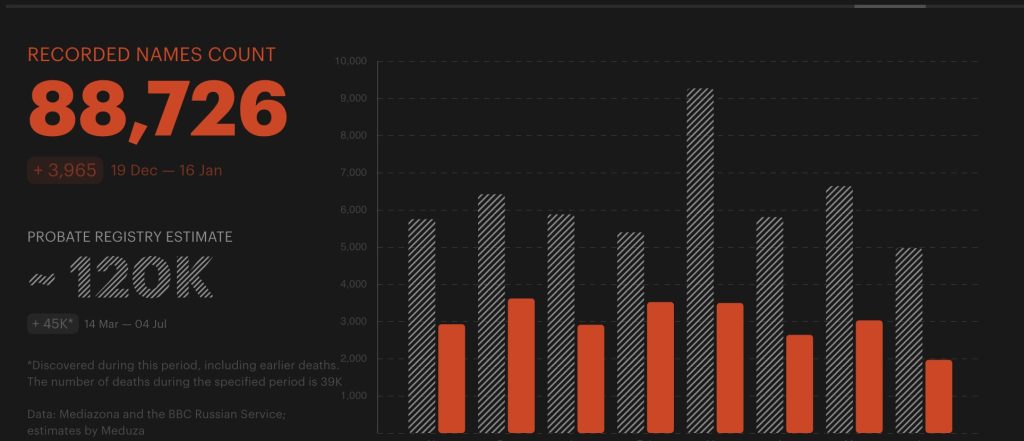Mr. President, I believe that the CIA is providing you inaccurate, false intelligence about Russia’s casualties and the condition of its economy. If you hope to realize your goal of opening negotiations with President Vladimir Putin to bring an end to the war in Ukraine, you must be equipped with the best information available.
You have been briefed that Russia has suffered devastating losses — as many as 800,000 casualties — and that Russia’s economy is weak and fragile. Data from open sources paint a diametrically opposite picture.
One of the best open sources for information about Russian casualties is Mediazona:
Mediazona (Russian: Медиазона) is a Russian independent media outlet focused on Anti-Putinist opposition that was founded by Maria Alyokhina and Nadezhda Tolokonnikova, who are also co-founders of the protest group and band Pussy Riot. The outlet’s editor-in-chief is Russian political journalist Sergey Smirnov.
Mediazona is an independent organization that is ideologically opposed to Vladimir Putin. It is the antithesis of a Russian propaganda outlet. Mediazona employs a multi-faceted methodology to track Russian casualties in the Ukraine war, which includes:
- Open-source intelligence gathering: They monitor publicly available information from news agencies, social media platforms, official military reports, and local residents’ groups.
- Collaboration: Mediazona works closely with the BBC Russian Service to track and verify casualty reports.
- Comprehensive database: They maintain a regularly updated casualty list, which currently contains over 44,600 names of Russian soldiers killed in action.
- Probate Registry analysis: Mediazona combines their casualty list with data from the Probate Registry database to estimate the true mortality rate among Russian men.
- Statistical modeling: They use a method that accounts for all excess male mortality up to age 50, considering factors such as social composition, delays in notary consultations, and death registration delays.
- Cross-referencing: The team verifies information by cross-checking multiple sources and databases.
- Volunteer network: A team of volunteers assists in data collection and verification.
- Continuous updating: The database is regularly updated to reflect the most current information available.
According to Mediazona’s latest data, there are 88,726 confirmed Russian combat deaths since February 2022. Mediazona estimates, using probate registry data, that the number may be as high as 120,000. This is a far cry from the numbers claimed by Ukrainian intelligence, which forms the basis of CIA estimates.
It is essential that you understand that Russia views this war as vital to its continued existence. Russia is not fighting to reconstitute the Soviet Empire. It sees Ukraine as a Western-proxy being used to attack Russia with US-and NATO-supplied weapons and intelligence, with the ultimate goal of destroying the current government. Accordingly, the only satisfactory outcome for Russia is to end this threat. President Putin is willing to accept a negotiated settlement provided that Ukraine is stripped of its capacity to launch future attacks on Russia and that NATO ends any consideration of making Ukraine a member of NATO.
According to the latest IMF projections, Russia’s economy is expected to grow by 1.4% in 2025, a slight increase from their previous forecast of 1.3%. This represents a slowdown from the estimated 3.8% growth in 2024. The IMF attributes this slowdown to several factors:
- Transition from a “war economy”: Russia’s economy has been running hot, fueled by substantial public spending on the war effort.
- High inflation: The IMF reports inflation in Russia at 8.3% in 2024, with sequential inflation even higher at above 9%.
- Monetary tightening: In response to high inflation, the Central Bank of Russia has raised interest rates to 21%, which is expected to weigh down economic activity.
The IMF’s forecast for Russia in 2025 is lower than the Russian Economic Development Ministry’s baseline forecast of 2.5% growth. However, it falls within the Central Bank of Russia’s current forecast range of 0.5-1.5%.
It’s worth noting that some Russian officials, including Economic Development Minister Maxim Reshetnikov, have criticized the IMF’s forecasts as overly pessimistic, arguing that they don’t account for measures taken by Russian authorities to support the economy.
Here is the critical point: Despite the projected slowdown, the IMF’s forecast suggests that Russia’s economy continues to show resilience in the face of Western sanctions, largely due to factors such as robust oil and commodity exports to countries like India and China, and the expansion of its military-industrial complex.
The Russian government view of its economy remains upbeat, with officials highlighting strong growth figures and resilience in the face of Western sanctions. The Russian government points to several key indicators to support this optimistic view:
- GDP growth: The economy grew by 3.6% in 2023 and is expected to grow by around 4% in 2024, making Russia one of the fastest growing major economies.
- Low unemployment: The unemployment rate dropped to 2.6% in 2024, a historically low level.
- Rising global economic status: According to the World Bank, Russia has overtaken Germany and Japan to become the fourth-largest economy in the world when measured by purchasing power parity.
- Increased investment: Fixed capital investment grew by 9.8% in 2023 and 14.5% in the first quarter of 2024.
- Trade surplus: Russia enjoyed a surplus of $50.2 billion in 2023 and $40.6 billion in the first half of 2024.
President Vladimir Putin uses these economic indicators to argue that Western sanctions have been ineffective and to showcase Russia’s economic model to partners in Asia and Africa. His message is resonating with the leaders of the Global South.
If you consider Russia’s perspective on the war in terms of casualties and the economy, Vladimir Putin is under no pressure to reach a negotiated settlement that does not address Russia’s strategic concerns that it will no longer face a military threat from NATO. If you fail to understand this and adjust your strategy to make a deal, your efforts to negotiate an end to war in Ukraine will not succeed.
Reprinted with permission from Sonar21.

